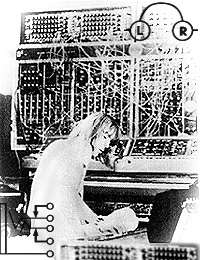Hey guys, here an interesting essay by K D Muller about Klaus Schulze, the german father of electro ambiant prog music.
Written in 1978, just after the release of the seminal "X" (electro structures meet classical music).

Klaus Schulze's first works, IRRLICHT and CYBORG, were
results from intensive study of classical music. At this time,
1971/72, Klaus Schulze's music was absolutely new and unknown,
just as synthesizers were a novelty. This didn't make his work
much easier at the time. But after ceaseless work and the release
of now ten solo productions, as well as ten concert tours through
Western Europe, has the position towards his electronic
instruments and his music become more tolerant and receptive.
Even today, Klaus Schulze sees himself as "classical"
composer and musician, yet his understanding of classical music
deviates from its conventional perception.
Apart from church music, every type of music that is today
being praised or dismissed as being "classical" was at the time of
its creation entertainment. Today it is even more so, in spite of
all attempt to label it with the image of "Ernst" (with capital E)
[German for "serious"]. This says nothing about qualities, only
about forms of contemporary reception.
Classical music is for our ears and our consciousness,
especially among the younger generation, musically outdated.
Those who believe this focus on such quantitative things as
instrumentation or the form of composition and presentation.
Those forms, especially the form of presentation, are certainly
antiquated. Those forms have only minute influence on the quality
and the message of the music, to which they only block access. If
we ignore these external features, we discover quality behind
them, expression of emotion; often packaged in daring combinations
of theme, instrumentation and rhythmic variety. It was not Zappa
who invented this. And in contrast to today's "serious
avantgarde" musicians, the historic composers did not forget about
the listener (just like Klaus Schulze). In spite of all the
daring, there remains a melodious sound, an internal coherence,
which opens up to the listener (sometimes after a certain amount
of time which he needs to clean his ears).
"An artist is never ahead of his time, but most people are
far behind the time." Edgar Varese
Marshall McLuhan has determined that the history of mankind
is characterized in a sequence of acts of technological extensions
of human capacity. The effects of these technological
achievements generate a radical transformation of our environment
and of the patterns of our thinking, feeling and judging. In this
process surfaces the tendency to elevate the past into an artform
(see above, classic), while simultaneously the new conditions are
regarded as corrupt and degrading. Only few artists in each epoch
have the strength and the boldness to live and work in direct
contact with the environment of their time.
Klaus Schulze makes his music with currently available
technological means. His instruments are synthesizers and modern
recording studios. Those manmade means are neither corrupt nor
degrading, are neither better nor worse than a violin or a piano.
A synthesizer is not a "synthetic" instrument. The meaning of the
word "synthesis" lies elsewhere; in the "combination to union".
Logic, a discipline which is not unimportant to music, knows a
"synthetic judgment": the subject states something new, something
that cannot be deducted from its descriptive name. "Synthesis" is
a higher form in which contradictions (thesis and antithesis) are
resolved. Thus it is a rather positive term, which has more to do
with "artistic" than with "artificial".
Klaus Schulze bases his music - most likely not consciously
-on the classical understanding of today's music that is described
above. It is known that the great masters of the past liked to
improvise, and it lies in the nature of the matter that there are
no records of this. Klaus Schulze improvises in a comparable
manner. Through the daily confrontation with one's own music it
is inevitable that patterns, structures and themes evolve, which
ultimately are incorporated in a composition. While in the past
compositions were transferred to the then latest medium, the
printing press, today's technological level allows publication in
the form of records or tapes.
The printed musical notation enclosed with this album are
intended for those who need it, who enjoy it, or simply those who
didn't think Klaus Schulze could do this. Due to above mentioned
reasons this is obviously an anachronism, though. [the album
shows 8 pages of handwritten notation for a symphony orchestra,
also a graphical chart for the synthesizers].
Be it written notation or modern media - the understanding of
Klaus Schulze's music is no easy task, mainly because of the lack
of a general consciousness for this type of music, and with it for
example the missing motivation for the purchase of the necessary
means of reproduction [i.e. go buy a fancy stereo, you Schulze
lovers]. But, even the imitators, the plagiarizers, are out there
already...
/PAlogo_v2.gif)


